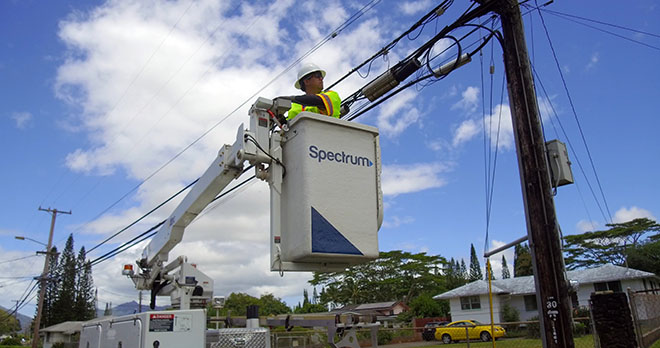Featured Topics
Featured Products
Events
S&P Global Offerings
Featured Topics
Featured Products
Events
S&P Global Offerings
Featured Topics
Featured Products
Events
S&P Global Offerings
Featured Topics
Featured Products
Events
Financial and Market intelligence
Fundamental & Alternative Datasets
Government & Defense
Professional Services
Banking & Capital Markets
Economy & Finance
Energy Transition & Sustainability
Technology & Innovation
Podcasts & Newsletters
Financial and Market intelligence
Fundamental & Alternative Datasets
Government & Defense
Professional Services
Banking & Capital Markets
Economy & Finance
Energy Transition & Sustainability
Technology & Innovation
Podcasts & Newsletters
25 Apr, 2025

| Charter maintained its long-term capex forecast during its first-quarter earnings call. Source: Charter Communications Inc. |
Charter Communications Inc. does not expect rising costs from tariffs to impact its network buildout plans or spending.
Charter CFO Jessica Fischer told analysts on the April 25 first-quarter earnings call that the company is continuing to assess the potential impact of new tariffs. At this point, though, Charter does not expect tariffs to have a significant impact on its capital expenditures outlays in 2025 and over the next several years.
The company expects to allocate $12 billion for capital expenditures this year. From there, capex is expected to shrink to the $10.5 billion to $11 billion range in 2026, $9 billion to $9.5 billion in 2027, and $8 billion in 2028.
Charter’s first-quarter capex totaled $2.4 billion, with $200 million for network evolution and $900 million for line extensions, respectively, as well as $1.3 billion for core operations. Capex was down from $2.8 billion in the first quarter of 2024.
Fischer said Charter is working with its equipment vendors "to minimize the impact of tariffs while at the same time, supporting the health of the cable equipment ecosystem."
The executive said Charter does not anticipate tariffs will have "a meaningful impact" on the company's profit performance, given the majority of its expenses relate to programming, labor and services, which are not subject to tariffs.
President and CEO Chris Winfrey added that Charter is somewhat shielded from tariffs given its domestic focus. "[Our] preference is to buy American-made products when they're available and when they're priced competitively," said Winfrey.
During the first quarter, Charter shed 181,000 pay TV customers, compared with 405,000 pay TV customers lost during the first quarter of 2024. The company finished the March 31 period with 12.7 million total video customers, down a million from 13.7 million a year earlier.
Fischer attributed the video amelioration to simplified pricing and the re-bundling the company launched in September 2024, along with its "Life Unlimited" brand refresh, which provides subscribers with access to connectivity through Spectrum's internet, mobile and video services.
The improved video performance did not yet reflect the benefits of incorporating entertainment apps in the company's products, she noted. Through hybrid linear and digital distribution pacts, Charter is offering its video customers access to a number of direct-to-consumer streaming services, including Disney+, Max, Paramount+ and Peacock. The paid customer base for Comcast Corp.'s Peacock rose to 41 million at the close of the first quarter, following the streaming service's launch for Spectrum customers.
Charter's broadband base of residential and small business customers declined by 60,000, ending the quarter at just over 30 million, down 1.6% year over year. The decrease included some 9,000 disconnects stemming from the Los Angeles wildfires, which destroyed many homes.
For the coming quarters, the company expects it will incur additional capital expenditures as the roughly 16,000 Los Angeles homes that were lost are rebuilt. Charter, though, does not think those outlays will require a change to its capex outlook.
On the mobile side, Charter added 514,000 residential and small business lines, pushing its total to 10.4 million.
Overall, Charter's first-quarter revenue edged up 0.4% year over year to $13.74 billion.
Net income attributable to Charter shareholders was $1.22 billion, or $8.42 per share, versus $1.11 billion, or $7.55 per share, in the corresponding period in 2024.
